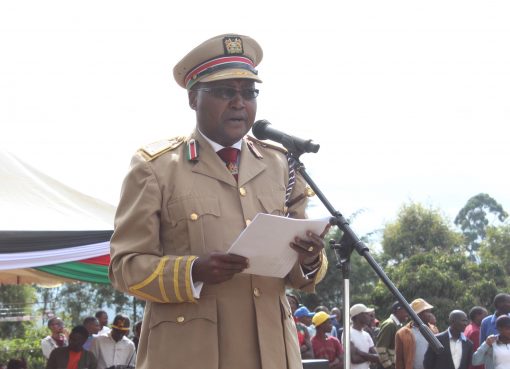As secondary schools are reopening after a two month’s break, principals are appealing to the national government, to release capitation for this year in full and on time
The principals drawn from Murang’a secondary schools, claim the issue of capitation is affecting the quality of education in the country and that as schools are resuming for the first term, it needs to be addressed urgently.
The Kenya Secondary School Heads Association (KESSHA) National Chairman, Mr. Willy Kuria, briefing the press at the Teachers Service Commission offices in Murang’a, on behalf of the Head Teachers, said that they don’t have funds to run schools and are grappling with debt because the capitation that is due to be sent by the government, is not being received in full.
“School management have complained about the high costs of operations and failure by the government to remit capitation money in full, and in good time,” said Kuria
The Government allocates Sh 22,244 per learner annually, under the free day secondary school programme. The money is sent to schools in three trenches in a year, where the first term receives 50 percent, the second term 30 percent, and the third term 20 percent.
Kuria noted with concern that this being the first term, the schools are supposed to be receiving 50 percent of the money stipulated. But so far they have received in their accounts about Sh 4,000 only.
“We are struggling, we are constrained. Without money in our accounts, we are unable to run the day-to-day activities of these schools,” he said, adding that already there is a deficit of around Sh 6,000 per child.
The Chairman said the government owes the learning institutions over Sh 64 billion in arrears as a result of partial remittance of the specified amount over the past few years.
Kuria who is also the Principal of Murang’a High School, said that last year, the amount of Sh 22,244 per student that was supposed to be sent to schools for tuition and operation costs, was not availed in full.
“Last academic year, we received a capitation of about Sh17,000 per student. And out of the money, we deducted Sh 5,000 for infrastructure development, which is not supposed to be the case, and other expenses such as textbook costs, and activities fees among others,” he said.
The Principal divulged that after the deductions, the money that remains per student is barely Sh 10,000 for the whole year. This makes it impossible to run the schools.
“We urge the State to ensure adequate funding to schools. We would like the government to ensure that every secondary school receives a capitation of Sh 22,244 per pupil in full and on time each year,” he said, adding that the amount is even not enough considering the cost of living has gone high.
The Chairman noted with concern that the trend of inadequate capitation, is causing almost all secondary schools in the country to grapple with debt.
He further said that the situation in schools is very critical, hence forcing some school administrators, to seek the intervention of parents, to ensure that learning is not interrupted.
“At times we keep on calling the parents to school, to try and bail out the school from debt,” he said, adding that the government should ensure that schools have adequate funding so that the financial burden is not passed to parents, who already are struggling financially during these tough economic times.
“In the newspapers, you can see suppliers have taken schools to court, for failure to make payments,” he said, adding that if this issue persists, it is going to compromise the quality of education in the County.
He further said that some school heads were forced to raise money from other means when schools reopened to cater for water and electricity supply that had been disconnected as a result of heavy debts.
Murang’a County Chair for Special Needs Schools, Charity Wanjiku, on her part observed that at times, the issue of finances is affected by the enrolment of learners in the NEMIS system.
Wanjiku said that when school heads are capturing the learner’s details ,some of them don’t have birth certificates and this poses a challenge when capitation money is being released to schools.
“Sometimes you may find learners are in the NEMIS system and indicate they don’t have birth certificates. So when it comes to capitation, they are not going to receive the money since they haven’t met the government guidelines,” she said.
Another challenge, she observed, is the negative attitude of some parents with differently abled children, where such children are always the last to be taken to school.
“When parents bring their children late, it means in the first term their details are never captured. They will be captured maybe in mid-second term,” she said, adding that this means their capitation for the first term will not be factored.
KESSHA has since petitioned Parliament to push the government to release all the funds owed to schools, to enable them to settle all the pending bills.
By Anita Omwenga and Purity Mugo




